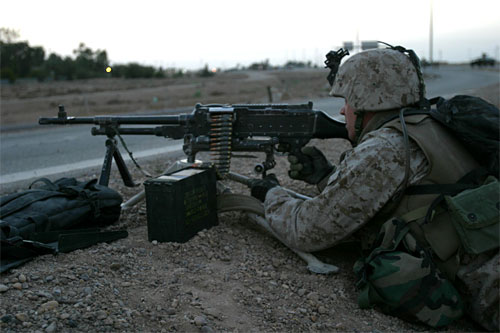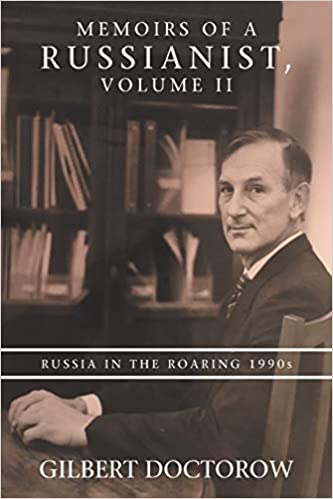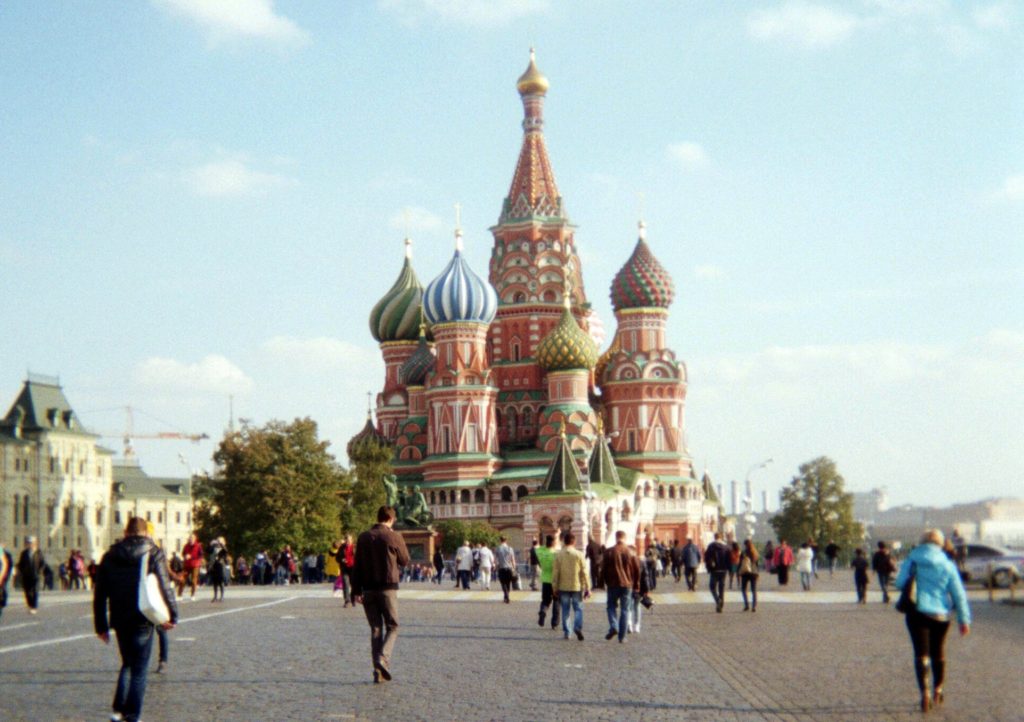
By United States Marine Corps photo by lance corporal Kenneth E. Madden III / Released – http://www.defendamerica.mil/newsphotos/apr2004/np040604a2.html, Public Domain, https://commons.wikimedia.org/w/index.php?curid=2184467
In the summer of 2004, I went to a peace activist’s house in Berkeley to hear Jo Wilding, a British aid worker who had been in Iraq in the leadup to the U.S. invasion and during early parts of the occupation (February and March of 2003 and November 2003 to May 2004), speak about what she saw. Her presentation covered several different aspects of the U.S. invasion, its aftermath and how different segments of the Iraqi population viewed it, ensuing war crimes, etc. I had gotten permission to interview Wilding afterward. Unfortunately, I have since lost the interview transcript. But I do have the transcript (below) of parts of Wilding’s presentation which was originally published at the Peace Gazette newsletter for the Mt. Diablo Peace & Justice Center in Walnut Creek, California in September/October of 2004. Warning: there are some graphic descriptions of war violence. – Natylie
Having gone once it kind of became part of me, so I went back and arrived the 15th of February 2003. It was very difficult to have open conversations with people because there was so much surveillance. You would manage to have conversations with people riding in the back of a taxi or walking on a crowded street.
There had been a huge amount of damage from the 1991 bombing. Under the sanctions, Iraqis couldn’t replace the sewage system because they weren’t allowed to buy machinery or technical supplies, so there was 500,000 tons of raw sewage being dumped into the fresh water sources every day, and people were hugely affected by that. The river is so polluted, especially in the north and near Kurdistan where people have no other water source. They’re drinking really toxic water.
There were really terrified kids. A leading authority on child trauma who came to Iraq said there was probably not a child in Iraq who wasn’t suffering from some degree of post-traumatic stress disorder – bed wetting, aggression, lack of concentration, nightmares, that kind of thing. We had three months worth of funding from USAID and we wrote a report which stated that the actions of the coalition forces were making the children’s trauma worse with bombing at night and going on violent house raids. Our funding was removed and the facility was converted into a center for torture victims of Saddam. Something that was making the coalition look bad was not funded, but if it was something that was focusing on the old government being bad, it was funded.
With the [traveling] circus, we did a show and we would play games. We had a huge bit of red fabric with which we would play parachute games. It taught the kids things like cooperation and communication skills and, instead of just looking at them, we played with them. At one refugee camp close to Shoula there were seventy-five families and a lot of them have a lot of children. They had mostly come up from the south. The kids were asking for blankets because it gets really cold at night in Iraq. People over there were saying that as much as they needed to rebuild the infrastructure, they also needed the psychological reconstruction – they needed some kind of healing process to start.
The second time we went, the girls were a bit more outgoing than the first time; one was just begging to be picked for cat-and-mouse. But there was one little boy called Abdullah and he had a bandage around his head and was scared of everything, just kept hiding behind his mom. It took a really long time for him to just come out of himself and be comfortable around us. We had this little game every time I came where he’d put something on my chair and run away. He just kind of started to come out much more, and kind of remembered what it was like to be a child and to just play.
Especially with the kids who came from Fallujah, you’d give them something to draw with and they’d draw pictures of planes dropping bombs on houses and tanks and things exploding. Their heads are so full of this violence that when you give them something imaginative to do, playing or drawing, that’s what comes out.
You regularly have exploding car bombs and roadside bombs. Often, the U.S. troops start shooting in an area where there has been a roadside bomb and sort of just open fire at random and kind of shoot everywhere, which causes a lot of civilian casualties. I remember seeing ongoing house raids and random arrests. The troops would surround the village and arrest all of the men, and often some of the women as well, especially if the man they were looking for wasn’t there. And then, when they would find out later that it was the wrong house, they would go back and go, “sorry, wrong house,” but they would never let the family members out of prison and they would never give them any compensation for the damage to the property.
People coming out of the prisons have been telling all kinds of stories of torture and abuse. One of the things that hasn’t yet come out in the news is that there are other forms of torture. People are talking about toenails being pried off, not being allowed to sleep, not being given water and enough to eat, being kept in these overcrowded tents. Some of the people said there were rumors of a mass grave under the prison. In one of these big white tents that holds about 300 people, they saw something and went down a few feet and found recently dead bodies from post-Saddam time. Bush has been saying that they want to knock down Abu Ghraib and, of course, that would be sealing up (or destroying) all kinds of forensic evidence.
The pictures from Abu Ghraib didn’t surprise anyone, but what made people angry was that Bush didn’t apologize. He said this isn’t the real America, but he never said I’m really sorry that this happened.
Iraqis were really angry because they had been promised this de-Baathification process. What started to happen was that Baathists were starting to be put back into positions of power. The former members of Mukabarat, the secret police [under Saddam] were being recruited into the new police. Iraqis were seeing all of their former oppressors being given back their positions of power. Promises had been made and gone back on. For months people had been told that there’s no jobs, and suddenly they’ve got 6,000 jobs for old Baath party members.
…The people who were really abused under Saddam, especially people in the south, were patient with the occupation. They were willing to accept having the troops there if it was a means of getting rid of Saddam. Anything was better than Saddam. What they found was that the U.S. troops were not going to leave after all, and that most of the reconstruction wasn’t being done.
The things that are being built – it’s not schools, it’s not hospitals, it’s not roads, it’s military bases. I don’t agree with invading a country as a means of liberating it from someone. There was a whole other array of options that were not explored. But I would say there was a window of opportunity when the U.S. could have isolated the people fighting them by doing a good job for the rest of the country. But they just didn’t see that and now just about everybody in Iraq is opposed to the occupation.
…(After the siege of Fallujah began), they gave us some bandages and bags of water. There were six internationals and six Iraqis and we went in through a desert road because U.S. troops had blocked off the road in. We get to the clinic and it wasn’t an ordinary doctor’s clinic. It wasn’t actually a hospital, but because there were so many casualties and because the U.S. troops had sealed off the main hospital and closed it down, there were a lot of other places operating as field hospitals.
Within about five or ten minutes of us arriving there, a family was brought in. There were two children. They both had bullet wounds in their heads and an old woman who was also injured by a bullet. The family said they had been leaving their house to flee Baghdad, and they had been shot by a U.S. sniper. All three of them died. They had no anesthetic because it wasn’t equipped to be a hospital. The blood bags were stored in a drinks fridge and they were warming them up under the pack in the toilet. It was just an absolutely desperate situation. The doctors had not slept properly in over two weeks since the bombing had started…
…The ambulance was clearly marked. It had “AMBULANCE” written in English across the front, a blue flashing light. It had a siren wailing. As we were driving through the American-held part of town, a shot was fired at the ambulance. We stopped and waited, thinking it was just a warning shot and we’ll be able to move in a minute. And they just opened fire on the ambulance. Countless people were being killed in Fallujah. Lots of people were burying bodies in their homes because they couldn’t take them anywhere. Whole families were living in houses that were bombed. The Pentagon actually issued a statement saying I was lying about our ambulance being shot at. What they say is that, if ambulances are shot, it’s because ambulances get used to transport guns and fighters and they get fired on from ambulances. There’s not actually a single documented case. They haven’t given a single example of when it happened…
…We went off to go get some sick people from one of the houses. As we got to the house, there was a man lying face down in the road and when we turned him on his back, his whole chest had been completely destroyed and so it was pretty clear that he had been shot in the back – shot through the trunk. I mean straight through his heart. The scopes on a sniper rifle are incredibly good and I’m sure it was possible to see that that old man didn’t have a gun in his hand…
…We weren’t being forced to invade that town. The four people that were killed in Fallujah were mercenaries: they were people on military missions; they were armed; they were former Special Forces that were sent in to kill people in Fallujah.
…The people who were fleeing from Fallujah were basically trapped at the checkpoints. The soldiers said: well, we’ll let women and children out. So they had this bunch of men stuck in Fallujah who wanted to leave and the fear was that there was going to be an intensified massacre once most of the women and children had left. So we tried to argue this point with the soldier and he said, “No, we want to keep them all in there because we can kill them all more easily.”
…They basically dehumanized people in Fallujah. They saw them as targets, not has human beings. If you talk to any soldiers, they will tell you that this is all sort of trained into them at the beginning of basic training…
…I would never say that leaving Saddam in place was a good idea. But things have become much worse for Iraqi women. They’re now walking around wearing hijabs. It was coming from fundamentalist groups who were at that point wielding quite a lot of power. They [U.S. troops] closed down Al-Sadr’s newspaper because it criticized the U.S. occupation, but he had been threatening women and labor organizations for a long time. [The women’s] main concern was security. They’d say we just need to feel safe walking down the street and we need to be able to feed our children, send our children to school and know that they’ll be okay. And a lot of girls had stopped going to school because of the fear that [rape] would happen to them, so they’re just being kept at home. So many women have just disappeared into their homes.
…Usually at the end of my talks I give a list of things that people can do – trade union solidarity I think is a really important one. They’ve got a thirty-five year gap. They’ve never really been able to have independent trade unions. Doing direct actions that are really disruptive at the offices of these companies that are making the contracts. And I think it is really an important thing to start telling people about the draft.

